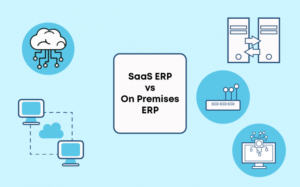
ERP stands for Enterprise Resource Planning that refers to the type of software for that organization that is used to manage the day-to-day business activities such as supply chain operation, compliance, accounting, risk management, project management, and procurement. The complete ERP suite will also include the enterprise of performance management, software that helps budget, plan, report, and predict the organizational financial results. In the ERP system, they tie together the multitude of the business process, and it enables some flow of data between them. By collecting the organization which shared the transactional data from multiple sources, the ERP system will eliminate the data duplication and provides data integrity with the single source of truth

In general, enterprise resource planning uses a centralized database for the different business processes, which helps to reduce manual labour and simplifies the existence of business workflows. The ERP system typically contains dashboards where the users can look at the real-time data collected from all across the business, which helps to measure profitability and productivity.
The ERP system works by decreasing the number of resources needed to run those businesses optimally but still, it ensures business improvement and profitability. The ERP system is various from the single application because it allows the other enterprise modules for your company which helps to work from the one database. The system will collect data from various parts of those businesses.
It has different operational types of that ERP software:
It is the ERP software that is deployed directly on the in-site devices. These systems are designed the businesses of all sizes though they may be more appropriate for medium and small companies.
It is like any of the open-source software, and these solutions let us inspect, enhance, and modify the ERP source code. It is used in the open-source that ERP has you customize the application which is better to suit the workplace.
In any of the ERP Software-as-a-Service (SaaS), it is available for over the cloud-hosting service, which is rather than the on-premise deployment. It is the option that lets you access the real-time data, which is as long as that you have Internet access and which is suitable for large enterprises.
The enterprise resource planning systems help to blend cloud-based deployment and on-premise.
In enterprise resource management which provides better business performance within these great benefits:
Before ERP systems, it coordinated between the multiple worksites that took a lot of effort and time. If you update on the specific part of the business, you need to visit or call the site physically.
For a business, the decision-making needs to be guided by accurate data. The ERP solution uses the tools of business intelligence that to provide data collection, reporting methods, and analytics. It has even ways to analyze the data in real-time which to make instant changes for the production process.
Share
Share on facebook
Share on linkedin
Share on twitter